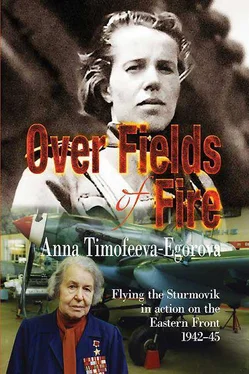“They say Timofeev fought during the Civil War?” someone asked Zoubov.
“He did. He was a scout on the Eastern Front, then a Deputy Commissar in the 15th Inzenskiy Regiment.”
“How do you know all that?”
“How could I not know? I was a flying cadet at the Orenburg School. Vyacheslav Arsenievich used to tell us about the Civil War, gave very interesting lectures.”
“What about?”
“Various things — I’d never heard anything of the kind before. And how to hold your knife and fork properly, how to smoke elegantly without leaving marks on your fingers. We were taught how to dance and how to invite a partner to a dance.”
“What’s this, the war had been on for two years and you were learning to dance?” Tolya Bougrov, a pilot with extensive burn scars on his face, asked angrily.
“Maybe, he also taught you how to choose a good wife?” Zhenya Berdnikov grinned.
“Sto-o-op the chatter!” The regimental Chief-of-Staff Major Kouznetsov loudly cut off our sotto-voce conversation, and everyone fell silent. Such was our introduction to Vyacheslav Arsenievich Timofeev…
The 197th Ground Attack Aviation Division successfully relocated to the Byelorussian aerodromes. The weather wasn’t spoiling us those days. A layer of thick fog lay dolefully over the airfield, and the Sturmoviks , having taxied out to the start point, had to turn their engines off. But then the wind blew and dispersed all the misty haze. The airmen of our division took off on combat missions one group after another. The Sturmoviks were bombing the vanguard of the enemy’s defences, neutralising the enemy’s artillery fire, blocking them on the roads, burning vehicles and tanks, wiping out infantry… Our routine work had started.
We co-operated with the famed General Chuikov’s Army (the 8th Guards) 153 153 Translator’s note — this Army distinguished itself during the Battle of Stalingrad.
— from the Czartorysk field aerodrome. It seemed to us, the airmen, to be a bit quieter over here after the fighting over Taman and the Kerch Peninsula, but it was far away from being so. On one sortie Captain Berdashkevich was leading a group of nine Sturmoviks to the target. They’d been given a complicated mission — to destroy a ford on the Bug river, and thus to impede the retreat of the enemy troops. Misha had meticulously ‘played out’ the whole route with the pilots: he had shown it them on the map, scribbled on the ground with a twig the distinctive landmarks, the flak guns’ estimated positions. Then each of the wingmen repeated the ‘flight’, and only when Berdashkevich had made sure that everyone had understood everything, did he order: “Off to your planes!”
On approach to the target the pilots heard his calm and gentle voice again: “Safety locks off. Spread out, keep freer…”
“Manoeuvring, guys! Manoeuvring!” Berdashkevich ordered and in a dive threw his machine at the ford.
The others followed him and the target was carpeted by bombs. But fiery tracer from the ground criss-crossed over the Sturmoviks . The pilot Khoukhlin’s plane somewhat clumsily, as if unwillingly, aimlessly, with a smashed wing and a destroyed stabilizer climbed up, and then abruptly lowered its nose and went towards the ground with a dead engine. Nevertheless, Khoukhlin managed to straighten out and then land the badly damaged Il-2 on a small, crater-pitted field beyond the ford on the enemy side — and the Hitlerites rushed towards the Sturmovik from all sides like carrion crows. The group leader Berdashkevich saw all this, and sent the remaining eight Ils to help his wingmen. The Sturmoviks diving one after another were beating off the Hitlerites surrounding our plane, and Andrey Konyakhin — a faithful and inseparable friend of Victor Khoukhlin — closed in for landing where the shot up Sturmovik stood.
Konyakhin’s plane touched down very close to the Khoukhlin’s Il, jolted over humps and bumps and stopped. The Fascists, scenting a double prize, rushed into another attack, but Berdashkevich and his group drove them off again. In the meantime Andrey, defending himself from the closely pressing submachine-gunners, was firing his plane’s cannons and machine-guns at them, but his trails of fire were going too high, missing the enemy. Then Konyakhin’s aerial gunner leaped out and… lifted the Sturmovik ’s tail with a superhuman effort! The pilot now began shooting at the Hitlerites on target. In the meantime Khoukhlin set fire to his badly damaged Il, ran to his friend’s plane and climbed into the rear cockpit with his gunner. Konyakhin turned his machine around, gave it full gas and a boost, and the Sturmovik rushed at the panicked Hitlerite sub-machine-gunners and then climbed into the sky.
Later Andrey told how after the take-off he began to doubt whether he had enough fuel to make it home. He glanced back at the gunner’s cockpit and went numb — two legs were sticking out of it next to the machine-gun! Dumbfounded, he didn’t understand at first that it was his own gunner, who had jumped into the already occupied cockpit on the run and had not managed to turn around in the tight space — he’d got stuck upside-down.
After the landing the engine stalled. Everyone who was at the aerodrome rushed to the motionless Sturmovik . They pulled one aerial gunner from the rear cockpit, then the other, then the pilot. Konyakhin was sitting in his cockpit, pale, his head thrown back on the protective screen, his eyes closed, his wet curly hair stuck to his temples. Major Karev was the first to rush to him and began to kiss him. Then, straight from the plane wing, he addressed his regiment comrades excitedly: “Comrades! The pilot Konyakhin has adhered to the great commander Suvorov’s precept: “Perish yourself but rescue your comrade!” He’s observed this commandment three times — he’s brought his Sturmovik back to the aerodrome, saved his friend and stayed alive himself! Let’s chair the hero!”
The pilots and gunners pulled Konyakhin out of the cockpit and carried him over to the headquarters dugout on their hands. The next day photojournalists from the Army and Front-level newspapers arrived unexpectedly. They wanted to photograph Andrey, but he hid from them and sent his total refusal via a friend: “They won’t get me! This is a combat airfield, not a photo studio and I’m not gonna pose.”
So, a piece in the paper was published without Konyakhin’s portrait. Later I became a witness of this dialogue between the friends: “You’re still alive?” Konyakhin asked Khoukhlin.
“I am, but how come they haven’t shot you down yet? They should have smacked you with shrapnel you-know-where to make you go to bed on time and not sit up late with Katyusha from the field ambulance.”
The city of Kovel was liberated from the Germans by July 7. Following that, we relocated to one of its aerodromes situated in the area. Once on a new field, I was immediately ordered to make a reconnaissance mission over the enemy’s communications, to detect his troop concentrations and to record that on a photo film accordingly. After taking off, I passed over the next airfield to join the fighters about to cover me. A couple were already waiting for me with their engines running. While I was circling the field, they took off and started climbing up. I quickly established a radio link with a flight leader of the fighters and without catching my breath ordered:
“I will run both a visual recon and make some photos. Please do not move far away from me — keep me covered. Is that clear? Receiving!”
Usually on such occasions the leader would of the fighters reply: “Understood!” and either repeat the task or specify if something was unclear. But this time after a short pause, there was a hoarse young tenor, full of sarcasm: “Hey, you, a ‘hunchback’! Why are you screeching like a milksop?” And after some silence he added with annoyance: “And you pretend to be a Sturmovik pilot? It is disgusting to hear you!”
Читать дальше












